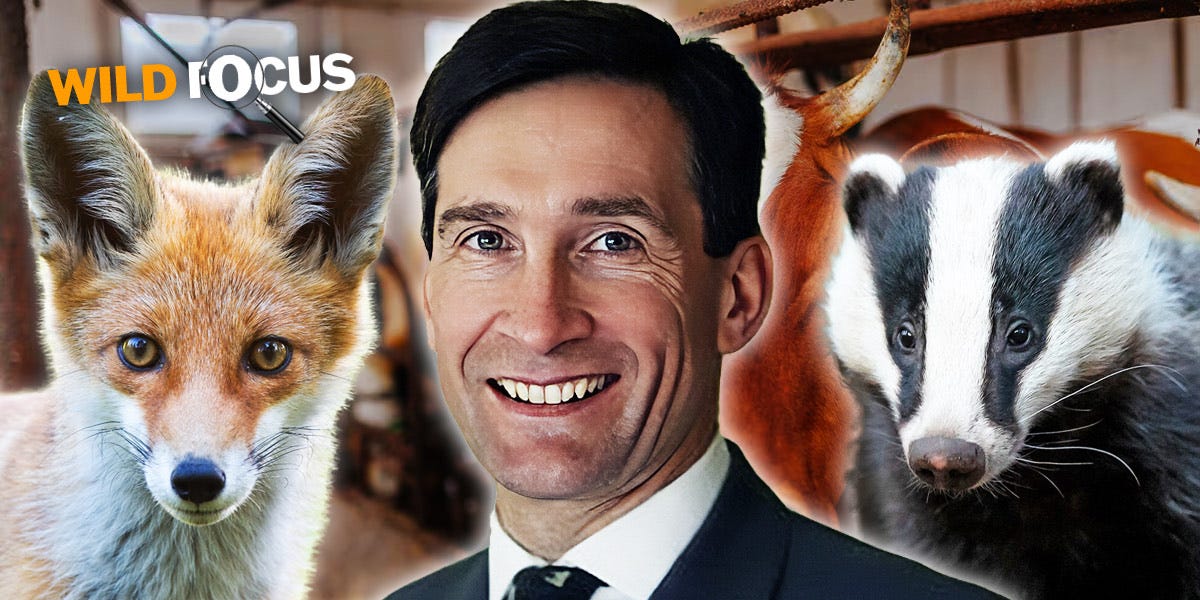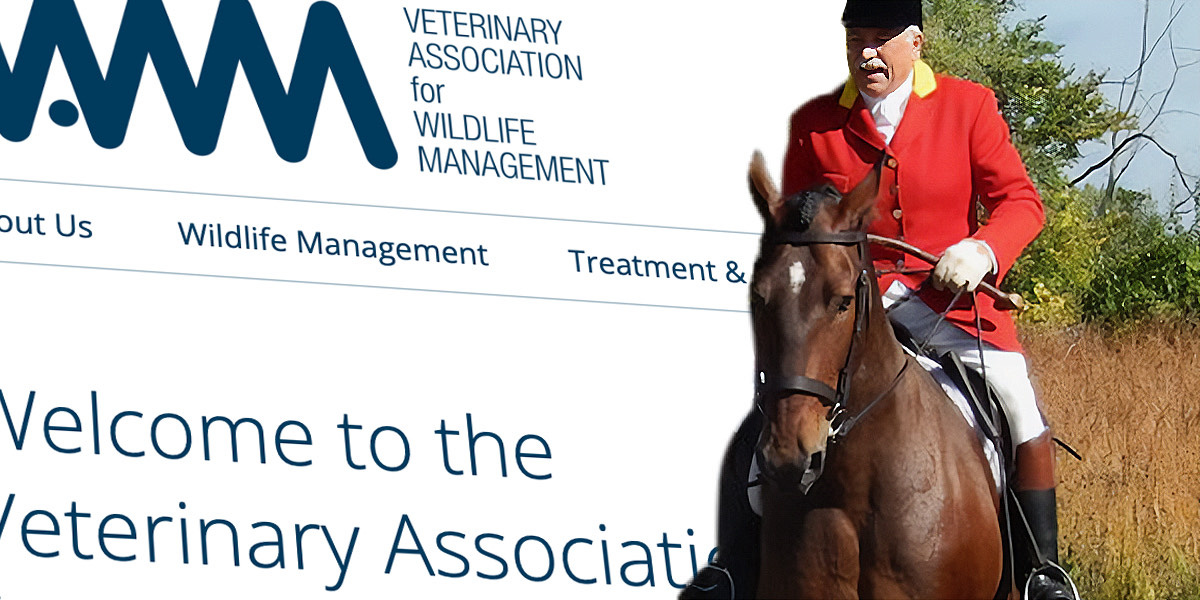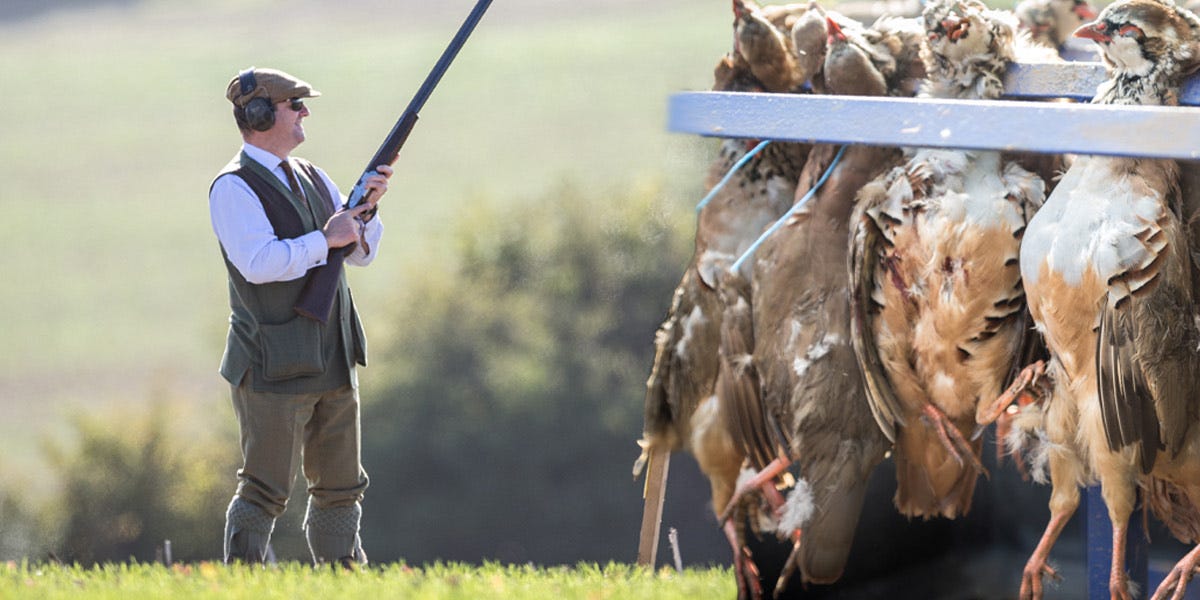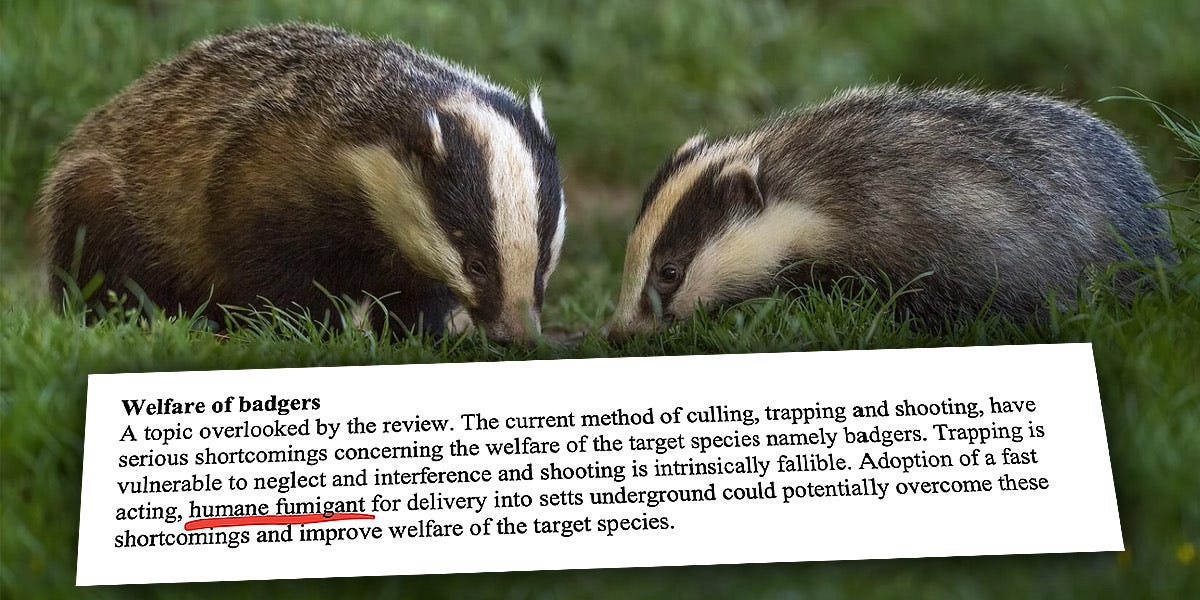Revealed: Vet group Fighting to Bring Back Hunting and Badger Gassing
What is the Veterinary Association for Wildlife Management and what does the group stand for? Protect the Wild investigates.
A group of veterinarians have been banging the drum about badgers in recent years, blaming the wild animals for causing bovine tuberculosis (bTB) in cows to an even greater extent than the government typically does. Indeed, they have criticised the country's bTB policy for not focusing on badgers enough. This policy has seen hundreds of thousands of badgers killed since 2013 in the name of tackling the disease in cows.
These vets belong to the Veterinary Association for Wildlife Management (VAWM). So, what is VAWM and what does the group stand for? Protect the Wild investigates.
Vets for Hunting
VAWM began life as an entity called Vets for Hunting. The veterinarian and researcher Richard (Twink) Allen, who hunted with the Thurlow Hunt, founded the group in 1999, alongside Dr Lewis Thomas.
Allen was known for his deeply controversial work on animal breeding – mainly involving horses – and passed away in 2021. As ethical campaigner Matthew Simpson has explained, much of Allen's work focused on developing 'assisted reproductive techniques', meaning interventions aimed at guaranteeing successful pregnancies. To this end, Allen variously implanted horse and zebra embryos into other horses, donkeys, and even rabbits, in his research projects.
Simpson pointed out that Allen shared his views on domesticated animals like horses with a House of Lords Committee in 2002. The researcher told the committee that a domesticated animal "is man’s product, essentially for man’s use." This viewpoint was certainly reflected in Allen's treatment of horses. As Simpson put it, Allen "decided to produce" them "in every possible way, with or without the natural co-operation of the animals."
Unsurprisingly, echoes of Allen's perspective on domesticated animals are found in VAWM's ideology, despite its focus on distinctly non-domesticated wild animals. The group effectively argues that because human actions have shaped and damaged the countryside, more human actions – in the form of "effective and humane wildlife management" – are necessary to clean up the mess.
In other words, while Allen argued for control of domesticated animals by 'man', VAWM advocates for people to control wild animals. Only the reasons for why that control is warranted differ in each case.
Hunting Connections
Since its beginning, VAWM has argued for hunting to form part of wildlife control. This has not wavered through the years, even as the group has expanded its scope in relation to promoting human domination – aka management – of wildlife. Taking a look at key figures in VAWM, and the group's connections, it's clear to see why hunting advocacy remains a priority for the group.
David Renney is chairman of VAWM. He owns Nimrod Veterinary Products, which is based at the same business village that VAWM is registered to. Nimrod has proudly sponsored point-to-point racing across several West Mercian counties. Point-to-point racing is an amateur horse racing event associated with hunts and Renney used to be a point-to-point racer himself.
As the pro-hunting lobby group Hunting Kind also highlights, which counts Renney as one of its 'pack', the VAWM chair has "hunted since childhood." VAWM is among the pro-hunting groups that have given their backing to Hunting Kind, according to the Fieldsports Channel. Hunting Kind is a group that wants hunters to be recognised as a minority group and their 'beliefs' protected under the Equality Act.
Other VAWM team members include committee member Liz Rhys-Jones, who previously served as secretary for a now disbanded beagle pack hunt. Hunter Aoife Byrne, who runs Bakonyi & Byrne Equine Vets in Ireland, is VAWM's secretary. Meanwhile, hunter Louisa Cheape is a VAWM committee member. In 2023, Cheape set up her own bloodhound pack in Fife to hunt the 'clean boot', meaning hunts where dogs follow human runners' scents.
The pro-hunting Countryside Alliance endorses VAWM. In 2015, it said:
"VAWM provides a crucial scientific pillar in the campaign for a proper understanding of wildlife management, including hunting, and deserves strong support."
The CA also described VAWM's AGMs as "always more than just a meeting, usually beginning with a trail hunt earlier in the day."
VAWM appears to represent a relatively small proportion of the veterinary community in the UK, considering there are over 30,000 practicing vets in the country. Although the group doesn't publish its member numbers, it reportedly had around 550 in 2004. Fast forward to 2023 and VAWM's Cheape managed to secure the signatures of just over 100 vetsfor an anti-Hunting Act open letter to ministers.

Nothing natural about hunting
VAWM says hunting should be part of wildlife management because it is humane and 'natural'. Back in 2000, VAWM founder Thomas summed up the group's latter contention in response to a paper that characterised hunting with dogs as cruel. He argued:
"Man if he is able and he is through hunting, has an obligation to cull the weak, the sick, the injured and the starving."
Put another way, Thomas claimed that the fittest wild animals are able to escape hunts, therefore mirroring the natural dynamic often seen between predators and prey in the wild. The argument that hunting is 'natural' in this way – as it is practiced in the UK – has been regularly debunked. For instance, Wildlife Guardian published the following statement in 2011, written by anti-hunt campaigner John Bryant:
"there is nothing ‘natural’ about sending people out at night to block up fox earths and badger setts so that foxes found by the hounds are forced into long exhausting chases and cannot do what comes ‘naturally’ and dive down a hole. Neither is there anything ‘natural’ about sending terriers down any hole to attack a fox that finds a hole missed by the Hunt’s earth-stoppers."
A hunt monitor who gave evidence during hearings in parliament in 2002 – when hunting was still legal – provided an example of just how grotesquely unnatural the experience is for foxes, due to ruthless behaviour by hunters. He said:
"I have seen a fox, bleeding from terrier bites inflicted when it was dug out, bagged and then released for the dogs to hunt. To help them follow the scent, the huntsman when holding the fox, before it was dropped in the sack, bowed its head to its brush to make it soil itself with urine."
Outrageous cruelty
The monitor described this situation and others he had witnessed as 'outrageously cruel'. This brings us to VAWM's other key contention, namely that hunting is humane because animals like foxes die quickly when killed by hounds, compared to other methods of persecution like shooting and snaring.
The Burns Inquiry, a probe into hunting set up in the late 1990s by the then Labour government, essentially found the opposite to be true. All four members of the inquiry, aside from chairman Lord Burns, had links to pro-hunting institutions. Nonetheless, even they determined that the hunting of foxes, hares, and mink, "seriously compromises" their welfare. The inquiry's findings ultimately contributed to hunting with dogs being banned.
The Burns Committee further noted that "most scientists agree that deer are likely to suffer in the final stages of hunting," although it did not draw conclusions on precisely when the welfare of deer was "seriously compromised" during a hunt. Cambridge University animal behaviour expert Professor Patrick Bateson was among the scientists who agreed that hunting caused suffering for deer. He published a study in 1997 which showed that hunting is physiologically detrimental to the animals, in relation to the chases that form part of it.
By delving further back into the hey days of hunting, the cruelty of deer hunting becomes even clearer. In the late 1940s, a private members bill sought to ban the hunting of several animals, deer among them. In a debate on the bill, MPs noted that hunting advocates claimed deer hunting was humane, using arguments that are similar to VAWM's. Namely, proponents said that dogs chased and brought deer 'to bay', meaning they forced the deer to stop and turn towards them, before a huntsperson would shoot the deer. In other words, hunting advocates claimed that deer kills were clean and quick.
But MPs recounted harrowing examples of dogs mutilating deer before they were shot. In one instance, hounds tore out a stag's scrotum, while another stag "had its tail, with several inches of the spinal cord, torn from its living body." In a further example, they recalled:
"a hind, which cannot defend itself, being pulled down by the hunt and eaten alive, so that by the time the huntsmen arrived the bones had been picked clean."
VAWM MIA on bird shooting
Of course, hundreds of hunts still exist in the UK and many of them continue to chase and kill wildlife. So, there is no need to look back in time to understand that hunting is cruel. Consider the staghound pack that reportedly attacked and killed a pregnant alpaca in January 2024. Or recall the fox who had her leg ripped off by hounds in November that year as she tried to escape into brambles from a foxhound pack. More recently, sabs reported a fox literally being torn in two by hounds in early January.
Despite all this, VAWM would have it that hunting is humane compared to alternatives like shooting. It describes shooting as "intrinsically fallible and inevitably produces a percentage of animals that are wounded."
Protect the Wild agrees that shooting is inhumane. But we find it curious that the shooting section in the 'animal welfare' page on VAWN's website relates only to foxes and contains no mention of the shooting of millions of birds each year for 'sport', considering the group's position on the use of firearms to kill wildlife.
As the League Against Cruel Sports highlighted in a written submission to the Petitions Committee in 2016, shooting industry insiders have said that some 40% of birds shot at for sport are wounded rather than killed outright. Yet this dire welfare situation, caused by the fieldsports fraternity, doesn't appear to be a focus for the vets at VAWM.
Blaming badgers
However, VAWM has taken issue with the shooting of badgers in the cull. In a response to the 2018 Godfray Review of the government's bTB strategy, VAWM argued that methods utilised in the cull, namely trapping and shooting, had "serious shortcomings" with regard to badgers' welfare.
The main method of culling is so-called free/controlled shooting, where badgers are shot at without being trapped first. This method has been widely condemned as inhumane, yet officials have repeatedly sanctioned its use in the cull, including the now Labour government.
To be clear, VAWM does not take issue with the culling of badgers. Its members, which includes ex-DEFRA veterinary staffers, have persistently painted badgers as the key cause of bTB in cows, despite an ever-growing, scientific evidence base that shows badgers are nothing more than scapegoat.
On this basis, VAWM is adamant that badgers must be 'managed'. But it has called for change in the method of badger culling. In its Godfray Review response, VAWM suggested that the development and targeted delivery of a "fast acting, humane fumigant" into infected setts could "potentially" overcome the welfare shortcomings of current methods.
In other words, VAWM has promoted the gassing of badgers as a method of culling. This has been done before, back in the 1970s. Badgers were gassed for years with cyanide before the policy was ultimately scrapped because research showed it to be a highly cruel way of killing the wild animals. Discussions in parliament at the time illustrate how inhumane this culling method was, as politicians decried the fact that thousands of badgers:
"have died painful or miserable deaths from starvation or slow asphyxiation, during which period the public have been led to believe that this was a humane method of destruction."
Reciprocity not oppression
Taken together, VAWM's views on wildlife 'management' reveal that its members are distinctly preoccupied with the past. In relation to hunting in particular, and badger culling to an extent, they advocate for a relative return to how things used to be done.
Turning back the clock will tackle the issues of the present, according to VAWM. For instance, the group says fox hunting is necessary to protect prey species amid the current biodiversity crisis. Indeed, the group paradoxically suggests fox hunting is necessary to protect foxes themselves.
VAWM's 2023 anti-hunting act open letter pointed out that fox populations have dropped in recent decades. It argued that this is due to too much persecution since the act came into force, such as over zealous shooting by landowners. VAWM presented hunting with hounds as a solution to the crisis for fox populations and their welfare. Unsurprisingly, it failed to point out that where fox declines have occurred, the culpability of hunters must be considered alongside landowners, because many hunts have continued to chase and kill foxes despite the hunting ban.
VAWM selectively acknowledges that the present is a product of the past in its advocacy. It says farming, human habitation, and "numerous damaging activities" have impacted the countryside. But it discusses 'wildlife management' as if it's a new idea, when it clearly is not. Throughout the UK's history and into its present, people have persistently manipulated, controlled, and persecuted wildlife, including through cruel hunting practices. Alongside other factors, this 'management' has contributed to the UK being among the most nature-depleted on Earth.
Protect the Wild firmly believes that we need to do away with the damaging idea that wildlife is ours to 'manage'. We advocate a relationship with Nature that is centred on reciprocity not oppression. Needless to say, we see hunting and badger culling as having no part in a better, kinder future for wildlife.
Want to watch our founder dismantle the Countryside Alliance on national radio? Look no further!
Our latest video is an animated version of Rob’s heated Radio 5 Live debate with a hunt supporter.









I would not be sending my animals to a vet that participated in this utterly disgraceful sickening and they look after peoples pets just another money making sceme to keep recieving the 30 pieces of silver of the slime ball government UTTER DISGRACE
Excellent piece that highlights the rapacious, entitled cruelty of the wildlife-haters. Reading it I found the cruel tone and manner of their practices strikingly resonant with those of the Israeli Defence Force in Gaza. (Apart from the bombing). I don’t believe this is a coincidence.
At some level the loves of one’s life - of wildlife and of human life - coalesce into one and considerate attitudes and action flow from this.
The same, alas, can be said for one’s hates.
It’s all connected.